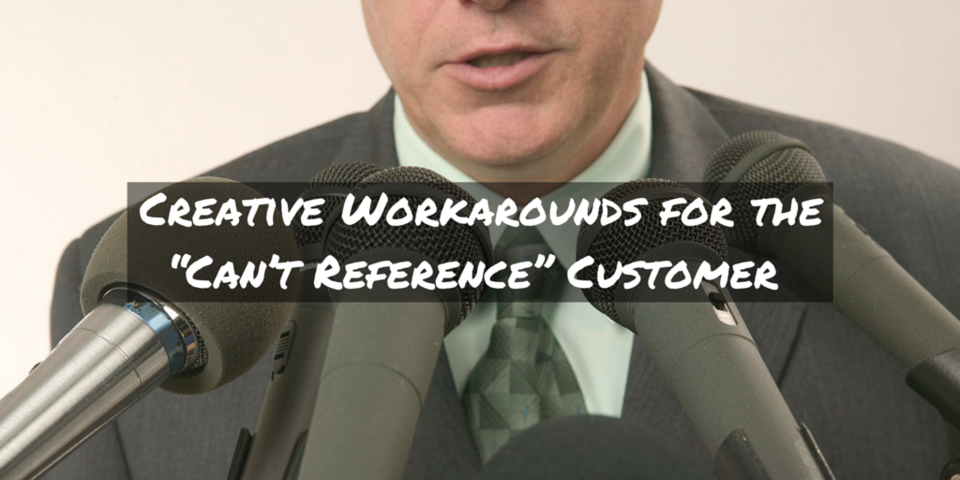Creative Workarounds for the “Can’t Reference” Customer

Posted By Kathy Wilson on September 24, 2015
Background Photo Credit: “speaker with a lot of microphones” by www.audiolucistore.it;https://www.flic.kr/p/chf5mG
Having customer advocates who happily and publicly sing the praises of a technology or service can be the Holy Grail for companies’ communications programs. After all, there’s no more powerful validation than that of a third-party who can attest to the value you deliver to their organization.
But what happens when clients aren’t referenceable for one reason or another? It happens all the time: your solution gives them a competitive advantage they’re not willing to share. They have a corporate policy that prohibits them from endorsing a particular vendor. Or legal or corporate communications get the jitters and shoot down the request.
How to leverage customers in the face of these challenges is a question we often get from our clients and prospects. Fortunately, there are a few creative approaches to consider before you take that customer off your reference database. Here are five best practices that have worked for Tier One and our clients:
1. Get It in Writing
Many companies work a reference clause into their sales contracts, whereby customers are obligated to participate in the marketing program in one form or another. Companies sometimes balk at these clauses, so sales teams are often willing to let these requests go during final negotiations. But checking to see what’s in the contract is always the best first step.
2. Define Your Reference “Tiers”
Clients will sometimes say “no” to a reference request because you’re not specific enough with your ask. We like to think in terms of “tiers” of reference, giving customers an opportunity to start small with requests they may not need to run up the corporate flagpole for approval. For instance, here are some reference “asks” in increasing order of involvement:
- Would you be willing for us to list your company name alongside some of our other customers in our boilerplate or on our website?
- Would you be willing to provide a quote in our (new product/product upgrade/milestones) press release?
- Would you be willing to speak by phone or in-person with a member of the press? (If the answer is yes, be sure to always speak with a customer prior to a media interview to discuss the story angle and run through some mock Q&As)
- Would you be willing to participate in a written or video case study program that we would share on our website, with prospects or with the press/industry analyst community?
3. Get Them On the Speaker’s Circuit
If your company is speaking at industry events, inquire whether your customer might be interested in co-presenting alongside you. (And by the way, the ability to deliver a customer is one of the surest ways to improve your chances of being selected to speak at a conference.) You’ll want to do everything you can to lighten their workload by offering to help them develop their presentation deck or talking points, and be sure to also offer to pay their travel costs to join you at the show. Once your customer is on stage with you, their story is effectively public and they might be more comfortable moving forward participating in other aspects of the communications program.
4. Make it a C-Level Priority
If you’re hoping to get a C-level customer involved in the reference program, get their C-level peer at your organization involved in the ask. A request from one senior executive to another likely holds more sway than a request coming from a member of the communications team. Make your executive team believers in the value of customer participation in the communications program, and get them out working the relationships on your behalf.
5. As a Last Resort, Go Anonymous
As a last resort, see if your customer would be willing to participate in a case study or press release that doesn’t specifically mention their name. You’ll still be able to describe the customer’s vertical market, their size and any market leadership position, the situation that required them to turn to your product or service, and the business value you’ve delivered to their organization.
Here’s a great Harvard Business Review article from 2012 that outlines the value of cultivating customer advocates as a key business growth strategy. Don’t lose hope if at first your customer declines to participate in your public reference program. Over time, as their business enjoys increasing benefits from your product or service, it’s possible they’ll be more willing and able to share their experiences with the public.

Kathy Wilson
Kathy Wilson is a Co-founder and Managing Partner at Tier One, where she leads the agency's Boston office and serves as a strategic client counselor. She taps her three decades of experience in B2B and B2C technology, digital healthcare, and financial services — including work counseling major brands like SAP, Citrix, Ultimate Software, GHX, and Ally Financial — to help clients meet critical business and marketing objectives. Kathy is a die-hard Red Sox fan and loves nothing better than a summer day at Fenway Park.


